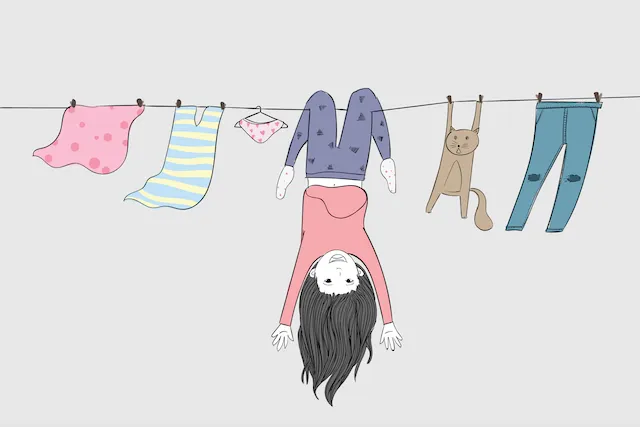Mindfulness in the Everyday Chores: Turning Routine into Ritual
In today’s fast-paced world, many people consider daily chores like washing dishes, folding laundry, or sweeping the floor as mundane tasks that simply need to be checked off a never-ending list. But what if these very activities could become opportunities for presence, peace, and even joy? This is the essence of mindfulness—bringing full awareness to the present moment—and it can completely transform the way we experience routine chores.
In today’s fast-paced world, many people consider daily chores like washing dishes, folding laundry, or sweeping the floor as mundane tasks that simply need to be checked off a never-ending list. But what if these very activities could become opportunities for presence, peace, and even joy? This is the essence of mindfulness—bringing full awareness to the present moment—and it can completely transform the way we experience routine chores. By shifting our perspective, ordinary tasks can become rituals that ground us, calm our minds, and enrich our daily lives.
This article explores how mindfulness can be infused into everyday chores, why it matters for our mental well-being, practical ways to cultivate it, and how turning routines into rituals can create a deeper connection with ourselves and our surroundings.
Table of contents
- What Does It Mean to Be Mindful?
- Why Chores Can Feel So Burdensome
- Everyday Chores as Opportunities for Mindfulness
- Turning Routine into Ritual
- The Psychological Benefits of Mindful Chores
- Mindfulness Practices to Incorporate During Chores
- Mindful Chores and Cultural Wisdom
- Overcoming Challenges to Practicing Mindful Chores
- The Deeper Meaning: Chores as Acts of Love
- Practical Steps to Begin
- Conclusion: The Sacred in the Ordinary
What Does It Mean to Be Mindful?
Mindfulness, at its core, is about paying attention to the present moment without judgment. It means noticing what’s happening right now—whether it’s the sensation of warm water on your hands while washing dishes, the rhythmic motion of sweeping a floor, or the sound of clothes gently tumbling in the dryer.
Most of us operate on autopilot when it comes to daily chores. We might be physically washing dishes but mentally running through tomorrow’s meeting, scrolling on our phones, or replaying a past conversation. Mindfulness invites us to return to the here and now, anchoring ourselves in the task at hand. Instead of rushing through chores as inconveniences, we can use them as reminders to pause, breathe, and reconnect with the moment.
Why Chores Can Feel So Burdensome
Before diving into the mindful approach, it’s important to understand why chores often feel tedious:
- Repetition: Household tasks are rarely “finished.” As soon as the dishes are washed, more will pile up. This repetitive cycle makes chores seem endless.
- Distraction and multitasking: Many people view chores as time wasted, preferring to think about other things or multitask rather than engage with the activity.
- Perception of low value: Society tends to place little importance on chores, viewing them as unskilled or unworthy of attention compared to “bigger” goals.
- Stress association: For busy individuals, chores can feel like another demand on an already packed schedule.
By shifting how we perceive these tasks, we can discover their hidden value—not just as things that maintain order in our homes, but as practices that maintain order in our minds.
Everyday Chores as Opportunities for Mindfulness

1. Washing Dishes: A Meditation in Water and Soap
Many people rush through washing dishes or avoid it altogether. But when practiced mindfully, it can be deeply calming. Feel the warmth of the water, notice the slippery texture of the soap, hear the gentle clinking of plates. Instead of focusing on finishing quickly, focus on the sensory experience of each dish. This simple act can become a form of meditation.
2. Cooking: A Ritual of Nourishment
Cooking is more than just preparing food; it is the art of transforming raw ingredients into nourishment. Mindful cooking involves noticing the colors of vegetables, the sound of onions sizzling, the aroma of spices filling the air. When approached with presence, cooking becomes an act of gratitude—for the food itself, for the farmers who grew it, and for the body that will be nourished by it.
3. Laundry: The Rhythm of Care
Folding clothes is often dreaded, but it can be reframed as a practice of care. Each piece of clothing holds memories of where it’s been worn and protects us daily. As you fold, notice the textures, the shapes, the simple order being restored. It’s not just about tidying—it’s about gratitude for the comfort clothes provide.
4. Sweeping or Vacuuming: Clearing Inner and Outer Clutter
As you sweep the floor, imagine that you are also sweeping away mental clutter. Each stroke of the broom can symbolize letting go of worries or frustrations. Cleaning the external environment becomes a mirror of clearing internal space.
5. Gardening: Grounding in the Earth
Though not strictly a “chore” for everyone, gardening provides one of the most natural ways to practice mindfulness. Digging into soil, tending to plants, or watering flowers connects us to the cycles of nature and the rhythm of growth. It teaches patience and reminds us that care leads to flourishing.
Turning Routine into Ritual
The key to transforming chores into rituals lies in intention. A ritual is different from a routine because it carries meaning, presence, and reverence. For example:
- Routine: Washing dishes to clear the sink.
- Ritual: Washing dishes as a chance to practice gratitude and calm.
Here’s how you can infuse ritual into chores:
- Set an intention before starting. Take one breath and remind yourself why you are doing the task—not just to get it done, but to care for your space and your well-being.
- Engage your senses. Notice the smells, textures, sights, and sounds.
- Slow down. Move at a pace where you can stay present, rather than rushing.
- Add a personal element. Light a candle before cooking, play soft music while folding laundry, or repeat a mantra while sweeping.
- End with gratitude. Appreciate the clean space, the prepared meal, or the folded clothes.
The Psychological Benefits of Mindful Chores
- Reduced Stress and Anxiety
Engaging in mindful chores helps calm the nervous system. The repetitive motions of cleaning or folding, when paired with present-moment awareness, mimic the effects of meditation. - Improved Focus and Presence
By practicing mindfulness during chores, you strengthen your ability to focus. This skill carries into other areas of life, helping you stay attentive in work, conversations, and creative projects. - Greater Appreciation for the Ordinary
When we slow down and notice details, we begin to see beauty in the everyday. Even something as simple as the shine of a clean countertop or the fragrance of freshly laundered clothes can spark joy. - Connection and Gratitude
Mindful chores can deepen gratitude—not just for the objects in our lives, but for the people connected to them. Folding your child’s clothes or preparing a meal for loved ones becomes an act of love. - Emotional Regulation
Chores provide a grounding practice during overwhelming times. Sweeping the floor or washing dishes can help release tension and anchor the mind when emotions feel heavy.
Mindfulness Practices to Incorporate During Chores
- Breathing Awareness: Sync your breath with your movements. Inhale while reaching for a dish, exhale while rinsing it.
- Body Scan: Notice sensations in your body as you move—your hands, posture, and rhythm.
- Mantra Repetition: Use simple phrases like “I am present,” or “I release and renew” as you work.
- Gratitude Practice: While folding clothes, think of one thing you’re grateful for about each garment.
- Sound Meditation: Tune into the sounds of the chore—the hum of the vacuum, the swish of water, or the rustling of fabrics.
Mindful Chores and Cultural Wisdom
Different cultures have long viewed chores as sacred or meditative. In Zen Buddhism, monks practice samu—mindful labor such as sweeping or cooking—as part of spiritual training. In Japanese culture, the tea ceremony elevates the act of preparing and serving tea into a sacred ritual. Indigenous traditions often view caring for the land as a spiritual duty rather than a burden.
These perspectives remind us that chores are not just practical tasks but opportunities for connection—with nature, community, and the present moment.
Overcoming Challenges to Practicing Mindful Chores
Of course, staying mindful during chores is not always easy. Here are some common challenges and solutions:
- Distractions from technology: Try leaving your phone in another room while doing chores.
- Rushing to finish quickly: Give yourself permission to slow down, even if only for five minutes.
- Resistance to repetition: Reframe chores as cycles of renewal, not endless repetition.
- Overwhelm from clutter: Start with one small area rather than the entire task.
Mindfulness is not about perfection—it’s about gently bringing your attention back each time your mind wanders.
The Deeper Meaning: Chores as Acts of Love
When reframed, chores are not just duties but acts of love—towards ourselves, our families, and our environment. Cooking becomes a way of nourishing, cleaning becomes a way of honoring our space, and laundry becomes a way of caring for the clothes that protect us.
This shift transforms drudgery into devotion. A home cared for with mindfulness reflects peace, and each small act of attention contributes to a larger sense of harmony.
Practical Steps to Begin
- Choose one chore to practice mindfulness with each day.
- Start small—even two minutes of mindful presence is enough.
- Notice resistance and use it as a cue to return to the moment.
- Celebrate progress instead of expecting perfection.
Over time, these small practices accumulate, transforming how you relate to your home, your time, and yourself.
Conclusion: The Sacred in the Ordinary
Mindfulness in everyday chores is not about romanticizing housework—it’s about reclaiming the present moment. By turning routines into rituals, we can bring meaning to even the simplest of actions. Washing dishes can be a meditation, folding laundry can be an expression of gratitude, and sweeping floors can be a way of clearing not only dust but also mental clutter.
In a world where productivity and speed are often prioritized, finding mindfulness in chores invites us to slow down, breathe, and rediscover joy in the ordinary. The next time you face a sink full of dishes or a basket of laundry, consider this: within these tasks lies an opportunity—not just to clean, but to live fully, right here, right now.
Keep Growing Through Everyday Mindfulness
If this article helped you see how simple actions can become mindful moments, here are more gentle reads to deepen your daily awareness and inner calm:
• The Power of Mindfulness – Discover how being fully present can reduce stress, enhance clarity, and transform ordinary moments.
• Mindful vs Mind Full – The Power of Living in the Present Moment – A simple but life-changing perspective shift: Are you living the moment, or just passing through it?
• How to Cultivate Self-Compassion Through Mindful Living – Learn how mindfulness can help you treat yourself with kindness, patience, and understanding.
Looking for Gentle Daily Reminders?
Explore Mindfulness Quotes – Short, calming reflections to help you stay present, peaceful, and grounded through everyday life.
The Positivity Collective
The Positivity Collective is a dedicated group of curators and seekers committed to the art of evidence-based optimism. We believe that perspective is a skill, and our mission is to filter through the noise to bring you the most empowering wisdom for a vibrant life. While we are not clinical professionals, we are lifelong students of human growth, devoted to building this sanctuary for the world.










